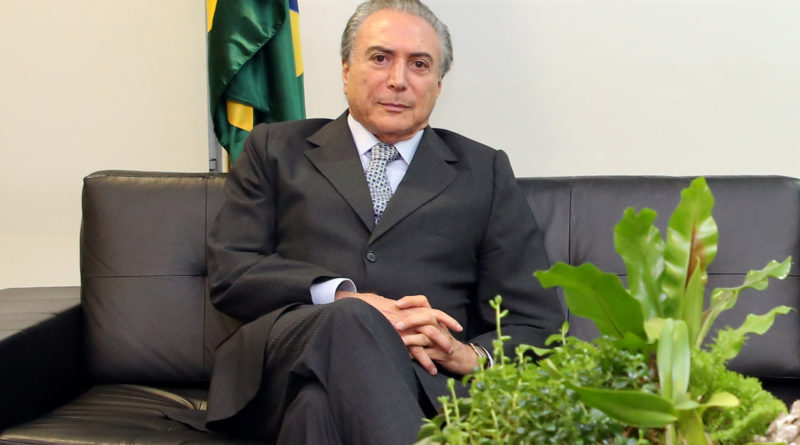Revenge of the Right in Brazil?
By Sean Burges, Senior Research Fellow at the Council on Hemispheric Affairs
This article was originally published by The Canberra Times on May 13, 2016.
About a month ago, when it became apparent that the centre-right opposition in Brazil would succeed in their politically-driven impeachment of the leftist president Dilma Rousseff, one of the biggest concerns raised by many observers was that the development gains made under 13 1/2 years of Workers’ Party rule would be reversed. The early signs from the centre-right presidency of Michel Temer are not promising.
Within scant hours of being elevated to the presidency from the vice-presidency, Temer dropped a presidential decree reducing the number of government ministries from 32 to 23. On the face of it this is a good thing and will help to reign in a bloated bureaucracy that places serious strain on the national budget. But deeper examination raises some serious concerns. Among the disestablished ministries are the Ministry of Agricultural Development and the Ministry of Women, Racial Equality and Human Rights.
Brazil is a country of contradictions. It is a fabulously wealthy place, but one which is staggeringly unequal where literally tens of millions of citizens try to eek out a subsistence living in remote rural areas. Assisting these people is the central mission of the Ministry of Agricultural Development, a department that has played a critical role in the great strides Brazil has made over the last decade in poverty reduction.
Equally worrying is the decision to shutter the Ministry of Women, Racial Equality and Human Rights. Although recently ruled by a woman, Brazil is still cursed by serious gender biases and glass ceilings. The country also exhibits levels of racism that beggar belief, with young black men in poor urban communities facing a worrying high chance of either arbitrary detention or extra-judicial execution, and this is for those who are not driven to join narco-mafias due to the lack of opportunities and social services. Indeed, in many ways one of the core challenges facing Brazil is human rights, precisely the policy area championed by this now-defunct department.
In his inauguration speech, Temer made the appropriate noises that his administration would be about inclusive growth, prioritising restarting the economy while simultaneously protecting the social programs launched by the two previous leftist presidents. Yet, it is hard not to escape the feeling that these are simply weak words uttered simply, as the Brazilians say in reference to the half-hearted abolition of slavery in 1888, “for the English to see”.
The optics of Temer’s cabinet are not good. It is entirely male, effectively excluding the perspective of just over half of the Brazilian population from the main policy-making table. Perhaps this should not come as a surprise. After all, shortly after it became apparent that Temer would eventually replace Dilma, the staunchly right-wing news magazine Veja ran a cover on Temer’s wife with a headline lauding her as the ideal: beautiful, reserved in nature, and content to manage the home. In contrast, another rightist magazine IstoÉ labeled Dilma as ‘hysterical’.
Temer’s cabinet is also entirely white. Almost half have been drawn from congress – a body wracked by corruption – and nearly all of them are from the south-east of the country. In many ways his team represents a microcosm of the national elites who have been protesting so vociferously against Dilma. This creates a serious danger for Temer’s presidency, one which is also under the threat of impeachment proceedings.
A dark and ugly division is emerging in Brazil. Lula and Dilma’s success in bringing over 30 million people out of poverty and into the middle class has driven massive changes in the country’s socio-economic structure. The comfortable days of the past where the predominantly white middle and upper classes working office jobs could easily afford domestic servants and expect instantaneous and cheap service have faded away. Indeed, this was the major complaint voiced in the country’s leading newspapers after Dilma won re-election.
The terror felt by the majority of poor Brazilians, who cannot afford the time to protest between the multiple jobs they need to survive, is that Temer’s government is going to be a ‘revenge’ of the elite. Temer’s promise to strengthen and improve the administration – often neo-liberal code for cutting – of the country’s hallmark social programs like Bolsa Familia is thus critical. Failure on this front could have dire social consequences.
Although unelected and occupying an interim position while Dilma faces trial, Temer has launched his administration with an air of permanency that suggests he expects to be in office until 2018 (when he must step down because he has been banned from running for elected office until 2026 by the Supreme Electoral Court). His cabinet looks like a government of the elite, which he claims will benevolently restore growth and prosperity to Brazil in much the manner of a platonic philosopher king. He has less than six months to deliver the goods. Although success will not heal the wounds in Brazilian society opened over the last year, failure could have devastating consequences and condemn Brazil to yet another “lost” decade.
By Sean Burges, Senior Research Fellow at the Council on Hemispheric Affairs
Sean Burges is deputy director, Australian National Centre for Latin American Studies, at the Australian National University.
Please accept this article as a free contribution from COHA, but if re-posting, please afford authorial and institutional attribution. Exclusive rights can be negotiated. For additional news and analysis on Latin America, please go to: LatinNews.com and Rights Action.
Featured Photo: Michel Temer. Taken From Flikr.


